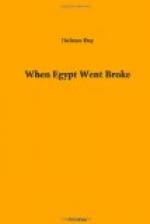Right behind Britt, as he stood on the porch, was a sheaf of yellowed papers nailed to the side of the tavern. Nobody in Egypt bothered to look at the papers; all the taxpayers knew what they were; the papers were signed by the high sheriff of the county and represented that all the real estate of Egypt had been sold over and over for taxes and had been bid in by the town as a municipality—and there the matter rested. Egypt, in other words, had been trying to lift itself by the bootstraps and was not merely still standing on the ground, but was considerably sunk in the hole that had been dug by the boot heels while Egypt was jumping up and down. Mr. Britt was not troubled by the sight of the yellowed papers; he owned mortgages and pulled in profit by the legal curiosities known as “Holmes notes”—leeches of particular drawing power. Mr. Britt did not own real estate. Egypt, in its financial stress and snarl of litigation, was a wonderful operating field for a man with loose money and a tight nature.
From far swamps the whack of axes sounded. Mr. Britt knew that men were cutting hoop poles and timber for shooks; Egypt earned ready money with which to pay interest, getting out shooks and hoop poles. That occupation had been the resource of the pioneers, and the descendants stuck to the work, knowing how to do it better than anything else. There was not enough soil for farming on a real money-making scale. The old sheep, so cynics said, were trained to hold the lambs by their tails and lower them head downward among the rocks to graze. Poor men usually own dogs. But dogs would not live long in Egypt, the cynics went on to assert; the dogs ran themselves to death hustling over the town line to find dirt enough to bury a bone.
Mr. Britt could see his statue in the cemetery.
Down the street was a one-story brick building, the only brick structure in the town. Set into the front of this building was a replica of the statue in the cemetery. Britt had secured special rates by ordering two statues from the stonecutter. Britt possessed vanity. He had hidden it, begrudging the cost of gratifying it. The crust of his nature, hardening through the years, had pressed upon that vanity. The statues, his refurbished beard, and his rehaired head had relieved the pressure somewhat, but the vanity was still sore. In his new mood he was dreading a blow on that sore spot. He realized what kind of a grudge he was carrying around. A vague sense of an unjust deal in life is more dangerous to the possessor than an acute and concrete knowledge of specific injury. The vagueness causes it to be correlated to insanity. Britt, putting his belated aspirations to the test, hoped that nobody would presume to hit on that sore spot. He knew that such an adventure might be dangerous for the person or persons who went up against him.
He buttoned his overcoat, settled the cigar rigidly into one corner of his mouth, stared with approval at the stone image of himself in the facade of Britt Block, and walked to the edge of the porch.




